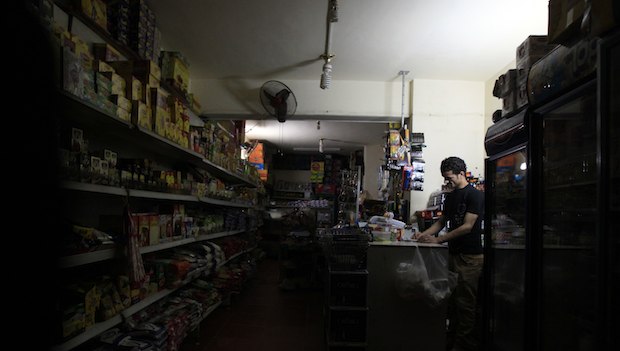
A supermarket seller stands near an emergency light during on of Cairo’s many power outages at his shop on April 16, 2014. (REUTERS/Amr Abdallah Dalsh)
Cairo, Asharq Al-Awsat—Egypt is considering raising electricity prices for some users as part of wide-ranging subsidy reforms, following an announcement on Monday that it will be doubling natural gas prices for some business and households from next month.
Ministry of Electricity and Energy spokesman Mohammad El-Yamani told Asharq Al-Awsat: “The Council of Ministers will indeed discuss the issue of raising electricity prices, and we as a ministry will provide a vision to restructure the prices. But it is certain that the decision has not been made yet, and it is still at the research stage.”
However, he maintained that any price rises would not “affect people with limited income” and that the discussions will focus on “the adoption of policies which achieve social justice.”
Yamani added: “We will target certain sectors. When we talk about the major customers, we have categories to identify those who have commercial or industrial [i.e. heavy] use.”
This follows speculation in the local press that the government would raise electricity prices in a bid to curtail a costly energy subsidies bill, following its decision on Monday to double natural gas prices.
Those gas price hikes, however, will only affect those connected to the country’s gas grid. Most homes, especially lower-income ones, still purchase butane cylinders for their gas.
Yamani dismissed rumors regarding an imminent increase in oil prices: this was not necessary, he said, given that Egypt is rolling out its smart-card system to distribute fuel.
An Egyptian official from the Ministry of Petroleum and Mineral Resources said on Tuesday that applying the smart-card system for car fuel would save the government around 33.5 billion Egyptian pounds (4.5 billion US dollars). The current subsidies bill is 140 billion pounds (20 billion dollars), with the government aiming to reduce this by 36.2 billion pounds (5 billion dollars) by the end of this year.
The new system, which is already being piloted in bakeries in Suez, limits the amount of a given subsidized commodity or service users can purchase. Consumption data is stored on a magnetic strip on the card so that any amounts purchased beyond the set limit are then charged at market prices.
Egypt subsidizes fuel and bread by importing goods such as diesel oil and flour at global market prices and then selling them on to the public at a considerable loss. The recent devaluation of the Egyptian pound and dwindling foreign currency reserves since the 2011 uprising have made importing these commodities even more difficult. The bill footed by previous governments has proved a burden on their successive budgets, and experts and commentators—as well as Egyptian politicians and businesspeople—are almost unanimous in their agreement that the system must be reformed.
Since the ouster of former president Mohamed Mursi, who initially announced the smart-card system for fuel during negotiations with the International Monetary Fund (IMF) for a 4.8 billion US dollar loan last year, both successive interim governments—under prime ministers Hazem El-Beblawi and Ibrahim Mahlab respectively— have announced they will be aiming to cut the country’s hefty subsidies bill.
Speaking to Reuters on the sidelines of the IMF and World Bank Spring Meetings in Washington, D. C., earlier this month, Egypt Minister of Planning and International Cooperation Ashraf El-Araby called the current energy subsidy system “unsustainable,” adding that the government wanted to go ahead with the reforms before the country’s upcoming presidential elections “to make his [the next president’s] life easier.”
The smart-card system faced harsh criticism from IMF officials last year when it was proposed during negotiations—one official described it as a “black box”—but the Oxford Business Group’s annual country report on Egypt for 2014 hailed the system as a “promising” reform tool.
According to state-owned news agency MENA, Ibrahim Sarhan, the chief executive of E-Finance, the company contracted to roll out the program, said that more than 2 million cards had already been distributed, and that the remainder would be passed out in the next few months.
Sarhan said the system would pave the way for further reforms to Egypt’s subsidies system.
Egyptian Finance Minister Hany Kadry Dimian said last month he expected the country’s budget deficit for the current financial year of 2013–14 to reach 12 percent of GDP, 2 percentage points higher than the government’s target. The current deficit stands at 123.6 billion Egyptian pounds (17.7 billion US dollars). He expected growth rates to hover between 2 and 2.5 percent.
The finance ministry announced at the end of March that the country’s budget deficit had shrunk by 6 percent of GDP year-on-year by the end of the second quarter of the 2013–2014 financial year.
